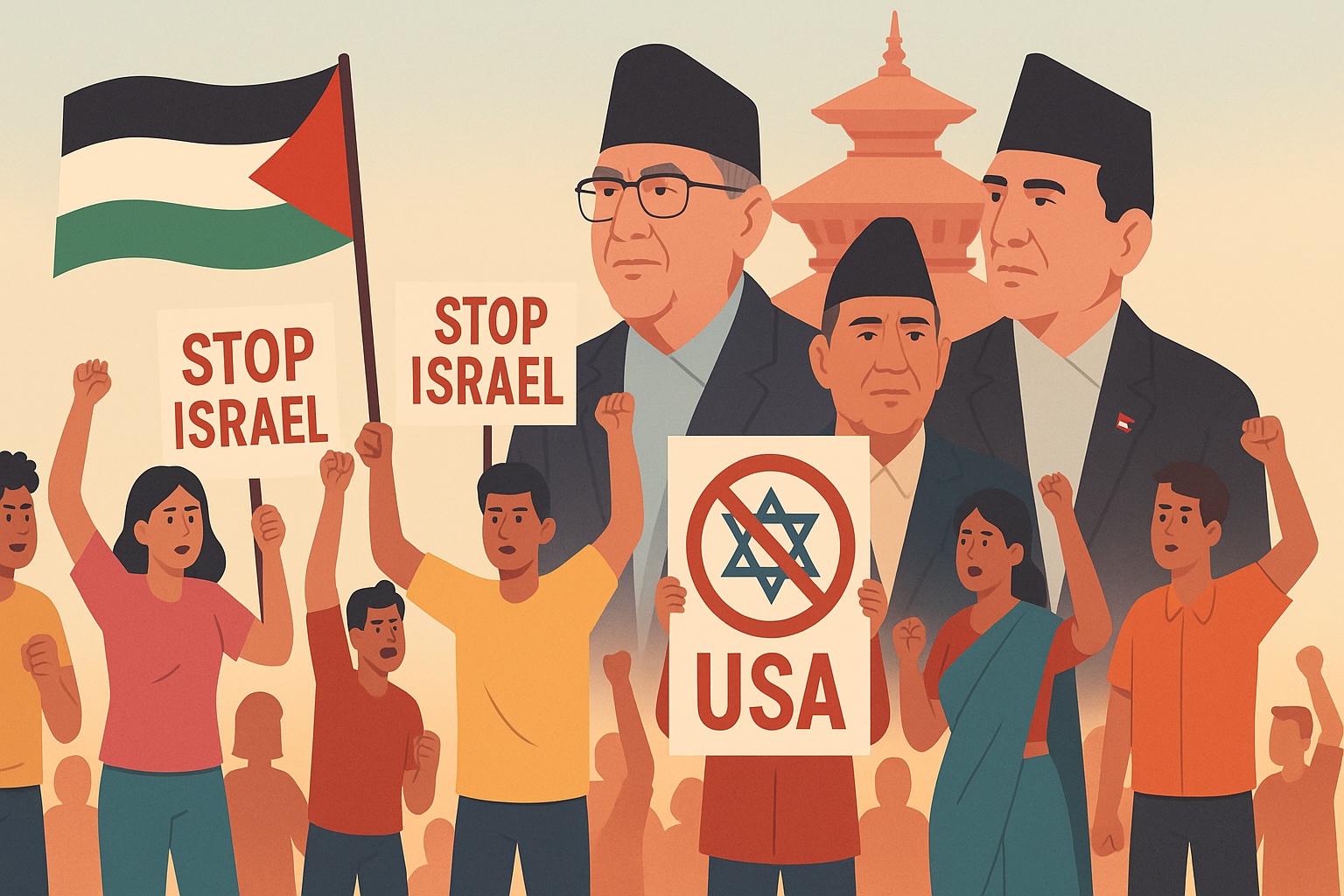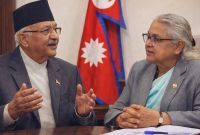Anti-Israel Protests Shake Kathmandu Amid Shifting Political Currents in Nepal

Kathmandu — Recent weeks have witnessed a surge of anti-Israel protests erupting in Nepal’s capital, Kathmandu, with demonstrators gathering prominently at Sundhara and outside the Israeli Embassy. These protests, involving a spectrum of groups including radical factions, signal growing public unrest over the ongoing conflict in the Middle East, particularly the escalating Iran-Israel tensions. The demonstrations underscore not only local solidarity with Palestinians but also reveal a deeper undercurrent of evolving political sentiments within Nepal’s diverse society.
The protests have been marked by vocal condemnation of Israel’s actions, with demonstrators decrying what they perceive as aggression and human rights violations. At Sundhara, crowds have gathered regularly, raising slogans and carrying banners demanding justice for Palestinians. Similarly, outside the Israeli Embassy, protests have taken on a charged atmosphere, with some fringe groups expressing radicalized views. Authorities have monitored these gatherings closely, mindful of potential security implications.
The recent flare-up in the Iran-Israel conflict, and especially the United States' overt involvement, has resonated powerfully within Nepal’s political circles. This concern prompted a notable convergence of political parties in Kathmandu, where representatives from eight leftist factions convened to discuss Nepal’s stance on the issue and regional geopolitics. The meeting underscored a shared urgency to respond to what many in Nepal perceive as undue U.S. interference exacerbating the conflict.
Emerging from these discussions was a call for a large-scale anti-USA protest, scheduled for Asar 11, 2082 BS (June 25, 2025 AD) at Maitighar Mandala. This proposed demonstration aimed to express solidarity against U.S. policies perceived as fueling violence in the Middle East and undermining global peace. However, the protest was abruptly called off following reported opposition from Pushpa Kamal Dahal ‘Prachanda,’ chairman of the Communist Party of Nepal (Maoist Centre). According to a report by a pro-Chinese media outlet, Prachanda communicated his disapproval through Maoist General Secretary Dev Gurung, instructing party members to cancel the rally and instead organize a workshop. This decision reportedly sowed frustration and resentment among the coalition of leftist parties and their supporters, with some leaders expressing doubts about the unity and resolve within the movement.
This episode reflects a complex and contradictory landscape within Nepal’s political and social fabric. While significant sections of Nepali society harbor increasing anti-USA, anti-Israel, and even anti-Indian sentiments—despite the United States and India being among Nepal’s key developmental partners—political leadership often treads a cautious path. The balancing act between public opinion, international relations, and internal party dynamics is delicate, with decisions such as the cancellation of the anti-USA protest highlighting these tensions.
Parallel to these developments, a discernible rise in pro-Palestine, pro-Iranian, and even pro-North Korean sympathies has been observed among certain groups within Nepal. These countries, however, maintain a relatively marginal role in Nepal’s broader development agenda and diplomatic engagements, making these ideological alignments more symbolic than strategic. Nevertheless, their growing visibility hints at shifting narratives influenced by global geopolitical currents and domestic political posturing.
Critically, these evolving political narratives raise questions about the direction Nepal’s foreign policy might take and the potential impact on its internal cohesion. The amplification of radicalized sentiments risks alienating vital international partners and could complicate Nepal’s diplomatic balancing act in an increasingly polarized world. Moreover, the public display of fractured political will—as evidenced in the cancellation of planned protests—signals underlying fractures that could affect governance and social stability.
As Nepal navigates these complex waters, the choices its leaders make in responding to regional conflicts and domestic political pressures will be pivotal. The path Nepal charts will not only shape its diplomatic posture but also influence the social harmony and political maturity of the nation. The unfolding scenario in Kathmandu thus serves as a microcosm of broader global tensions and a reminder of the challenges facing countries caught at the crossroads of shifting ideological and geopolitical currents.
Israel USA Embassy



![From Kathmandu to the World: How Excel Students Are Winning Big [Admission Open]](https://nepalaaja.com/img/70194/medium/excel-college-info-eng-nep-2342.jpg)
